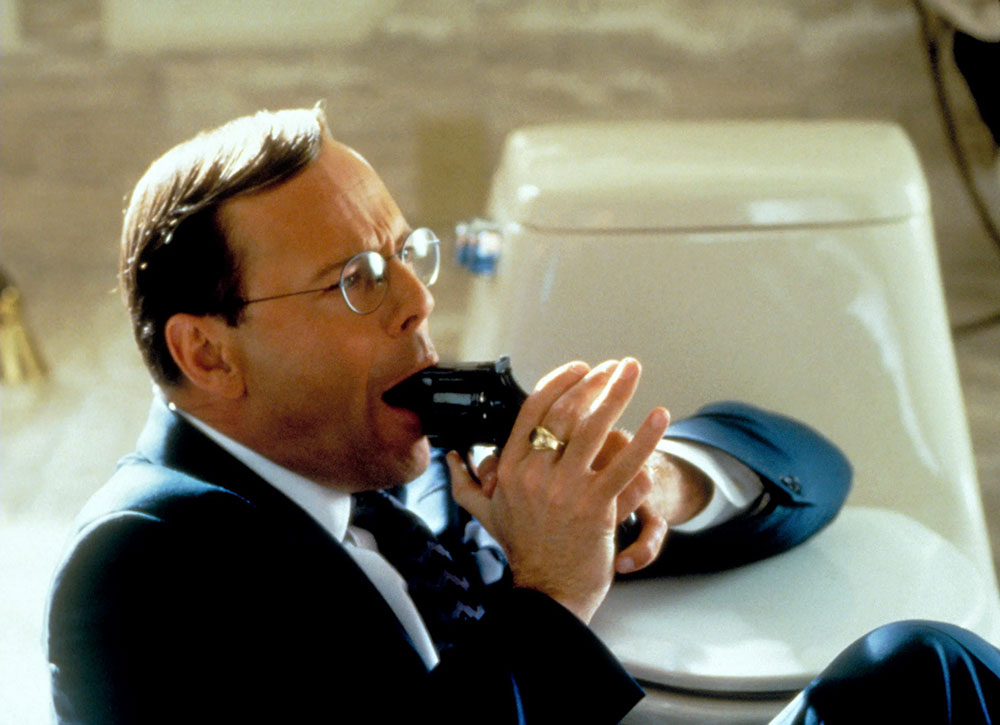In 1999, American cinema was full of tales about alienated men with white-collar jobs—Office Space, American Beauty, Eyes Wide Shut, Fight Club. Alan Rudolph’s Breakfast of Champions vies with Being John Malkovich as that year’s strangest, bearing closer resemblance to ‘80s films about Middle America such as True Stories (1986) and Blue Velvet (1986) than its contemporaneous releases. The film didn’t go down easy in 1999, when Disney buried it with a cursory release and most critics trashed it. Yet there’s something to the film’s garish look, lack of likable characters, and refusal to entertain easy interpretation. While Breakfast of Champions is off-putting, it feels deliberately so—a mix of New Hollywood cynicism infused with a dash of psychedelia that feels representative of the Clinton administration’s last days. The film’s style posits that real emotions can exist in a hollow, fantasy-driven simulacrum informed by T.V. ads and no less than the French filmmaker and critic Luc Moullet called it “a mind-blowing vision of the New America [...] where the excess of mush, dumps, and mud is becoming vomit-inducing.”
In the film, Dwayne Hoover (Willis), owner of a car dealership, is a minor celebrity in Midland City. But at home, he greets the morning by sticking a gun in his mouth until his wife (Barbara Hershey) calls him for breakfast. At work, he cheats on her with one of his employees. He has also disowned his son, the lounge pianist Bunny (Lukas Haas), for being gay. Invited to an arts festival in the same town, the writer Kilgore Trout (Albert Finney) hitchhikes across a dingy Midwest full of adult bookstores and smog-pumping factories. Cross-cutting between their two stories, Breakfast of Champions puts Hoover through a full-on meltdown that peaks when he meets Trout.
The film also references Hawaii throughout its runtime and even features a soundtrack by exotica composer Martin Denny. The soundtrack suggests that Breakfast of Champions takes place in the ‘50s, but it’s based on a Kurt Vonnegut novel published in 1973. Robert Altman wanted to film it at the time and commissioned Rudolph to write the script, but that plan fell through. Instead, Willis ended up funding most of the production himself. By the time the film came out, damning the American suburbs as a hotbed of repression had long been a cliché. Although, Rudolph’s take is an unusual one. Unlike in most films about such settings, few of Midland City’s secrets are hidden. Rather than suppress their emotions, the characters in Breakfast of Champions express themselves openly and broadly. Then, there’s also the fact that the film’s color scheme pits the most saturated shades of bright red, yellow, green, blue, and purple against each other to see how far they can clash. This makes Midland City look ugly and unappealing, as though its residents were dwelling inside one of the cheesy commercials airing on local T.V. Rudolph also uses Dutch angles and unflattering close-ups to make the proceedings even queasier. His style strains to be as artificial as possible.
Sporting glasses and a combover toupee, Hoover is the opposite of the action heroes Willis came to specialize in. All the same, his presence helps Breakfast of Champions come together as a reflection of the damaging impact of fame. In the film, Hoover becomes a walking piece of spectacle. In fact, the film shows one of his dealership’s T.V. commercials before it even shows him, and repeats this commercial ad nauseam throughout its runtime. Even his own co-workers treat him as an image, throwing a party where they all wear masks of his face. Suburbia is blown up into an unreal space in Breakfast of Champions, a place where all gestures and actions are highly exaggerated. Being seen as an idol rather than a struggling man blows up Hoover’s ego, even as his self-hatred mounts and leads him to dangerous conclusions about human existence.
Rudolph’s film remains messy and puzzling in ways that don’t feel entirely intentional, but his devotion to his specific vision of a hyper-unreal Middle America, presented with a corrosive skepticism about the American Dream, remains a marvel. Without ever referencing French theorists like Guy Debord or Jean Baudrillard, Rudolph comes to similar conclusions about corporate America and its landscape. No wonder Disney resisted such an unflattering mirror.
Breakfast of Champions screens tonight, November 4, and throughout the week at Alamo Drafthouse Lower Manhattan.



